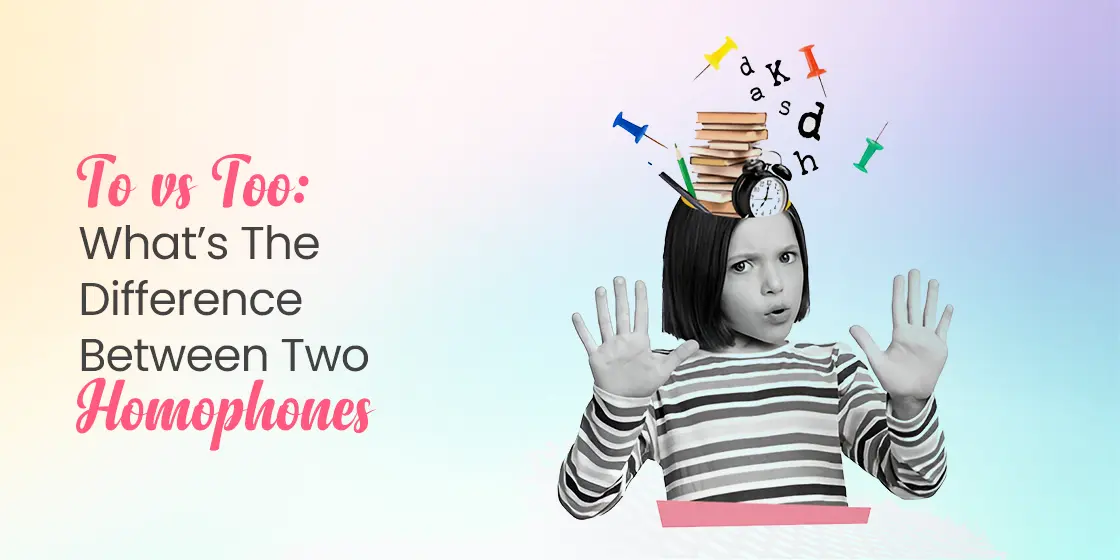Table of Content
Know the Difference Between Similar Sounding Homophones
English can be a tricky language, full of rules, exceptions, and words that sound the same but mean very different things. One such category of words is homophones. These are the words that are pronounced the same but have different meanings and spellings. These words can easily trip up writers and speakers alike, especially when it comes to spelling and clarity in written communication.
A classic example of homophones is the set of words: to vs too. Although both are pronounced exactly the same, they serve distinct purposes. To is most often used as a preposition or part of an infinitive verb, while Too means “also” or “excessively”. Despite their identical pronunciation, using the wrong one can change the meaning of a sentence or make it confusing.
Learning how to correctly use homophones like to and too is an important part of mastering written English. These small distinctions can have a big impact on how clear and professional your article writing services can be. In the rest of this blog, we’ll discuss in detail how both of these words differ from each other while sounding very similar. Let’s start from the basics understanding what are homophones below.
What are Homophones?

Homophones are words that sound the same when spoken but have different meanings and often different spellings. They come from the Greek words “homo”, meaning same, and “phone” meaning sound. Despite their identical pronunciation, homophones are not interchangeable, and using the wrong one in writing can lead to confusion or misunderstanding.
A classic example of homophones includes words like pair, pear, and pare. Each of these positive words sounds the same but refers to completely different things. Pair means two of something, while pear is a type of fruit, and pare means to trim or peel. The key to understanding homophones is recognizing their individual meanings and correct contexts in both speech and writing.
Homophones are especially important to learn in English because the language has many of them due to its diverse linguistic roots. While they don’t usually cause problems in spoken conversation, they can be a major source of spelling and grammar errors in writing. Developing a strong grasp of homophones helps improve reading comprehension and writing accuracy, making communication clearer and more effective.
To vs Too: Explaining the Key Difference

The words “to” and “too” may sound the same, but they serve very different roles in a sentence, and understanding how to use them correctly is essential for clear writing. “To” is one of the most commonly used prepositions in English and is often used to indicate direction, purpose, or relationship. It is also used in infinitive verb, where it connects the subject to the action in a general sense.
On the other hand, “too” has an entirely different function. It can mean “also” or “as well”. While “to” is more about connection or movement, “too” adds emphasis or inclusion. Even though these words are pronounced the same and classified as homophones, their meanings and grammatical roles are not alike. Being aware of these differences helps prevent common mistakes in both casual and formal writing.
How to Use To in Sentences?
We regularly use “to” in sentences in many ways. It is certainly not much difficult because we use this preposition quite frequently in listicle articles, copies and other content pieces. Here are some examples how you can use to in sentences.
- I decided to walk to the library instead of taking the bus.
- She promised to help me with my project over the weekend.
- He drove to the countryside to get some fresh air.
- They invited us to their big wedding next month.
- I forgot to bring my notebook to class this morning.
- She always tries to be kind to everyone she meets.
- We need to talk about your plans for the summer.
- He wants to travel to Japan to experience the culture.
- I sent an email to the manager explaining the issue.
- She offered to take care of the dog while we were away.
- They moved to a quieter neighborhood last year.
- He struggled to understand the math problem.
- I’m planning to bake a cake for her birthday.
- She learned to play the piano at a young age.
- We walked to the top of the hill to watch the sunset.
How to Use Too in Sentences?
Unlike to, the usage of too in sentences require a particular context. It is not a preposition that can be used between the power words in a sentence. Instead, it is used in a context in which something extra is referred to. Here are some examples related to it.
- The soup was too hot to eat right away, so I waited for it to cool down.
- She was too tired after work to go to the gym.
- It’s too late to catch the train now; we’ll have to wait for the next one.
- He speaks too quickly during presentations, making it hard to follow.
- The suitcase was too heavy for her to carry up the stairs alone.
- You’re driving too fast on these icy roads; please slow down.
- I’m too busy with deadlines this week to attend the meeting.
- The movie was too long and slow-paced for my liking.
- She’s too nervous to perform on stage in front of a large crowd.
- He felt too sick to go to school, so he stayed in bed all day.
- That coat is too expensive, even if it’s on sale.
- The music is too loud in here; I can’t hear what you’re saying.
- It’s too cold outside to go for a walk without a jacket.
- I’m feeling too exhausted after the trip to cook dinner tonight.
- They arrived too early for the concert and had to wait an hour.
Frequently Asked Questions
| What are homophones? Homophones are words that sound the same but have different meanings and often different spellings. They often make writers confused, hence these words should be used very carefully. |
| What is the difference between sea vs see? Both sea and see are homophone words. Sea is a noun that refers to a large body of saltwater, while see is a verb that means to perceive with the eyes or to notice. |
| What is the difference between bear vs bare? Bear can be a noun referring to the animal or a verb meaning to carry or endure. Meanwhile, bare is an adjective meaning uncovered or exposed. |
Final Words
That concludes our entire article in which we have discussed key differences between words like to and too. Both of these words are homophones, meaning that they sound similar in pronunciation but have different meanings. As a writer, it is important for you to understand their differences, as this could help you to avoid many mistakes in writing. This blog in defined how to use both homophones in sentences, so make sure to read it thoroughly to understand the correct usage practices.

Unleash your brand story`s potential with eContentSol – your creative writing companion. We craft narratives that captivate. Ready to elevate your content game? Dive into creativity with us and let`s bring your ideas to life.


